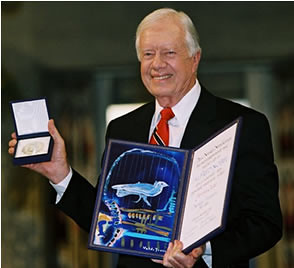The 39th President of the United States, Jimmy Carter, died Sunday. He was 100 years old.
He was the longest living president in history, surpassing George H.W. Bush who died at age 94.
He was also the first U.S. president who was born in a hospital.
He married Rosalynn Carter in 1946. At the time of her death last year, they had been married an incredible 77 years, the longest-married presidential couple. (They also surpassed George H.W. and Barbara Bush, who were married for 73 years.)
Known as the peanut farmer who became president, his family had a peanut farm since 1928. He worked on the farm until he went to college (Georgia Southwestern State University).
He entered the U.S. Naval Academy in 1943, receiving his first commission three years later. Following his father Earl's death in 1953, Carter left the navy to return home to help run the family farm. He, his wife Rosalynn, and their three sons at the time, had to live in public housing.
His public service began in the mid-1950's, as he became deeply involved in his community, serving on several local boards, eventually serving on the Board of Education of Sumter County.
He ran for Senator in 1962 and won, going on to serve two terms.


After failing to win the Democratic gubernatorial nod in 1966, Carter tried again in 1970. This time, he won the nomination, going on to win the governorship.
During the campaign, Carter leaned in a racist bent, even criticizing his Democratic opponent, Carl Sanders, for supporting the Rev. Dr. Martin Luther King, Jr. However, during his inauguration speech, Carter stunned the crowd, receiving only tepid applause, when he commented on racial segregation in Georgia.
Leroy Johnson, a Black Georgia state Senator who was, at the the time, the first Black senator elected in Georgia in fifty years, commented on Carter's campaign stance versus his inaugural speech by saying, "I don't think you can win this state without being a racist."
Carter's comment, you can imagine, did not sit well with southern segregationists, many who had helped get Carter elected. Carter knew what he had to do in the campaign so that he could work for civil rights in Georgia...and later in his presidency.
Carter announced his bid for the presidency in 1974, near the end of his term as Governor. (At the time, governors were limited to just one term in Georgia.) In the Democratic primaries, he was one of seventeen total candidates -- seventeen! He was mostly known only in Georgia, so his odds of winning the primaries and going on to win the nomination was, indeed, a long shot. In fact, the question "Jimmy who?" was an often-used dismissal of his candidacy.
Carter, however, used that to his advantage, regularly saying, "My name is Jimmy Carter and I'm running for president" in his speeches and commercials. His strategy, which included giving over 200 speeches in thirty-seven states before any other candidates declared they were running, eventually paid off.
In the Summer of 1976, Carter picked Minnesota senator Walter Mondale as his running mate.
Carter won the nomination and had maintained a lead in the polls over incumbent President Gerald Ford until September, when it dwindled, even leading to a virtual dead heat less than a week before Election Day.
Then, the infamous Playboy magazine interview was released just a couple of weeks before the election, in which Carter admitted to having committed adultery by having lust in his heart. (Well, the Bible does say adultery isn't only a physical act.)
This was back when many men claimed they bought Playboy "only for the articles". Clearly, it was not a smart political move and almost sunk his candidacy. Conservative Christians, who were one block of his supporters, were furious. (He could have admitted that before running for president...and why Playboy?!)
Still, Carter prevailed, winning 50.1% of the Popular Vote and 297 Electoral Votes to Ford's 48% of the Popular Vote and 240 Electoral Votes. He was sworn in on January 20, 1977, the last time the inauguration took place at the East Portico of the Capitol.
Carter's presidency was a mixed bag. Some might use the word "mixed", some might use the phrase "not very good". There were some key successes and some serious failures. Some of his success were the establishment of the Department of Education and the Department of Energy, the U.S. Foreign Service lifted its gay and lesbian personnel ban, signing the Mental Health Systems Act [most of which was repealed under Reagan], grating diplomatic status to the People's Republic of China, and signing the second Strategic Arms Reduction Treaty (SALT II) with the Soviet Union.
Perhaps his greatest achievement came in early September of 1978. Having been unsuccessful at mediating an end to the war between Israel and Egypt, President Carter invited Israeli Prime Minster Menachem Begin and Egyptian President Anwar Sadat to meet with him at Camp David, the presidential retreat for negotiations.
The negotiations did not secure a withdrawal of Israeli troops from the West Bank, but it did result in Egypt changing its position and formally recognizing Israel, as well as agreeing to the establishment of an elected government in the both the West Bank and Gaza. Thus, the Camp Accords effectively ended the war between Egypt and Israel.

Sadat, Carter, and Begin at the public signing
of the Camp David Peace Accords
Carter's biggest (and ultimately insurmountable) hurdles were the economy and the Iran hostage crisis. The economy was good at the beginning of Carter's presidency, but inflation and high unemployment numbers (a 6.6% average for his term) countered that. The inflation rate would fare even worse. The overall year-over-year (YOY) inflation average during Carter's term was 9.9%.
The second oil crisis in this country, beginning in 1979 and continuing into 1980 -- oh, I remember odd-even gas rationing then -- saw OPEC raise the price of a barrel of crude oil over 150%. Obviously, this increased inflation even more, resulting in an inflation rate of 11.3% in 1979 and 13.5% in 1980.
Just like this year, if inflation's bad, it does not bode well for an incumbent president.
The final nail in the coffin politically for Carter began on November 4, 1979. The Iranian Revolution student uprising which included the storming of the American embassy in Tehran, resulting in the taking hostage of fifty-four U.S. diplomats and citizens, would irrevocably taint an already souring public opinion of Carter and his administration.


Negotiations failed over and over. Two military attempts to rescue the hostages -- one attempted, one planned but aborted -- were unsuccessful, and further stained both Carter's and the United States' image. Carter and his administration tried to get the hostages released all the way up to his last day in office, to no avail. It was often perceived publicly that Carter was useless in getting the hostages released. I remember one of my college professors referring to him as the "do nothing president".
Ronald Reagan won in a landslide in 1980, but it wasn't until he was sworn in as the 40th President of the United States on January 20, 1981, that the hostages were released after 444 days in captivity. I remember the television news anchors simultaneously announcing any updates on the hostages' release throughout the inauguration broadcast.
Carter may not have had a high rating as president, but it was clearly his time after the White House that garnered the greatest praise. It remains the largest part of his amazing legacy.
Carter's own Christianity was genuine. It was neither a mere talking point nor some political cloak that he wore when advantageous. He believed it and lived it. It is a refreshing look-back when it comes to a president's faith compared to many of those in office since.
While in office, he taught Sunday school at First Baptist Church of Washington, D.C. After leaving office, he returned to teaching Sunday school at his and Rosalyn's home church, Maranatha Baptist Church in Plains, GA.
The year after leaving office, the Carters started the Carter Center, which is located adjacent to the Jimmy Carter Library and Museum.

Another well-known initiative that the Carters had been involved in is Habitat for Humanity.

Projects were funded by its Fund for Humanity, and the Fullers decided to take the Fund for Humanity concept abroad. They went to Zaire, which is now known as the Democratic Republic of Congo. After spending three years there to get the program off the ground, which was successful and still exists today, the Fullers returned to the U.S. to begin Habitat for Humanity International; it became official in 1977.
In was in 1984 that Jimmy and Rosalynn Carter joined in Habitat's efforts and gained the organization its biggest notoriety. They weren't simply spokespersons, faces seen to advertise the organization. No, they did the work, the on-site work, the physical work, right alongside others. They were one of the crew.

looking over much-needed renovation work

Mascot Flats today
In 1999, President Bill Clinton awarded the Presidential Medal of Freedom to both Jimmy and Rosalynn Carter, citing his work as president and their incredible work in this country and around the world.



"offers a personal consideration of 'moral values' as they relate to the important issues of the day. He puts forward a passionate defense of separation of church and state, and a strong warning about where the country is heading as the lines between politics and rigid religious fundamentalism are blurred"[publisher's description]
It was a profound read, and it has become even more relevant over the years. I recommended it after reading it and I still highly recommend it today.
In closing, I would like to cite a passage in Carter's 1996 book Living Faith, in which he describes his life experiences and his religious values transformed in a living faith. In this passage, he writes "the most unforgettable funeral I've ever attended, maybe with the exception of those of my own family members, was the service for Mrs. Martin Luther King, Sr., mother of our nation's greatest civil rights leader."
He relays the story of the pastor's sermon, in which he says two dates will be on her gravestone, the day she was born and the day she died. He then focused on "the little dash in between", saying that little dash represents the whole of one's life. He said that little dash was everything to us and to God.
He then said to the gathering, "The question is, What do we do with that little dash in between, which represents our life on earth?"
No doubt, Jimmy Carter did a lot with his little dash. Because he did, he made the world a better place. May we do the same.
Rest in peace, God speed, and hail and farewell, President Jimmy Carter.
Terry
January 4-6: Events throughout Georgia will be held.
January 7-8: A horse-drawn carriage trip through Washington to the U.S. Capitol, where Carter will lie in state in the Rotunda.
January 9: National service at the National Cathedral / National Day of Mourning; interment in Plains, GA.












